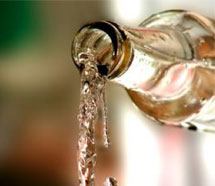 What do you think is the most important cooking ingredient, and you will rarely see it in the ingredient list of any recipe? It is water. Water is the basis for soup, the builder of sauces, the braise of beef. It deglazes a pan, fluffs up a cake and adds crunch to a cookie. We boil it to cook rice, pasta, potatoes and I’m sure you can think of a dozen more ways water is essential in your kitchen.
What do you think is the most important cooking ingredient, and you will rarely see it in the ingredient list of any recipe? It is water. Water is the basis for soup, the builder of sauces, the braise of beef. It deglazes a pan, fluffs up a cake and adds crunch to a cookie. We boil it to cook rice, pasta, potatoes and I’m sure you can think of a dozen more ways water is essential in your kitchen.
Almost every food contains water, as it is essential to all of life. Every system in our bodies depends on water, from sight to hearing, to our heartbeat and our lung capacity. Our bodies are approximately three-fourths water and most of the foods we prepare hold about the same amount. The water we consume transports and transforms our food into materials our body can use, and expedites the removal of wastes it cannot use.
Water is a lubricant, a solvent and our thermostat. As a lubricant it provides a medium for the transport of materials throughout our bodies. It cushions our joints, surrounds vital organs and moisturizes our skin. Water dissolves nutrients so our bodies can absorb them and dilutes toxins to reduce their harmful effects. In hot weather water in the form of perspiration cools us, and when the air chills us, water acts as insulation to help warm us up.
The temperature of the water we drink makes a difference too. Tissues can best absorb and make use of water when it is sipped rather than gulped, and cool rather than iced. Drunk in this way, water can replace your afternoon caffeine fix, as the cause of tiredness is often traced to dehydration. Heated liquids can also be reviving. A bowl of hot soup or herbal tea delivers nourishment and healing properties quickly to the body. Even a mug of steaming water has a calming, as well as a warming effect.
The specific health benefits of water are debated, but most medical professionals agree that we do not consume enough water through our food to keep our bodies at optimum performance. One study involving more than 20,000 men and women determined that adults drinking just 5 or more glasses of water each day were about 50% less likely to die from a heart attack. Other research has shown that drinking water helps maintain proper blood pressure, provides essential minerals, improves mental performance, increases athletic performance, and helps regulate digestion. All this, with zero calories!
Water is so important to life that it is a metaphor for Torah:
” EVERYONE… THIRSTS FOR WATER” (Isaiah 55:1)
The Talmud (Baba Kama 82a) says this is spiritual thirst; we will be satisfied and refreshed from drinking in the words of Torah.
Just as water has no taste unless one is thirsty; so too, Torah has no taste unless the person desires it. Then it is delicious and refreshing.
Just as water leaves a high place and flows to a low one; so too, the Torah. If one is haughty, the words fall away and when one learns in humility, the words of Torah flow toward him.
Just as everyone needs water, whether they are rich or poor, wise or simple; so too, a great person can become wiser by learning with someone less endowed.
Just as water is cleansing; so too, when we immerse ourselves in words of Torah we are purified.
Just as water makes all life grow; so too, the words of the Torah are essential to the Jew, and a source of life for the world.
Just as rain water falls in drops and becomes streams, then rivers, so too with the Torah; one studies a bit today and adds some more tomorrow, then in time he will become like a flowing stream, and a mighty river.
-George Mateljan, The World’s Healthiest Foods, An Essential Guide to Your Healthier Way of Eating, 2006
Renee Chernin lives with her husband, David, in Jerusalem’s Old City where she writes and cooks while working on her forthcoming cookbook, “Cooking for The King,” the book of Torah insights, recipes and cooking tips designed to bring majesty to the mundane. Get a glimpse of more essays and recipes on www.thekosherchannel.com.
The words of this author reflect his/her own opinions and do not necessarily represent the official position of the Orthodox Union.
